
NEW DELHI - The Supreme Court Monday dismissed a plea by S. Nalini Srikaran, undergoing life imprisonment in the Rajiv Gandhi killing, who had challenged a provision in the law that mandates the state government take prior consent of the centre before remitting the sentence of a convict whose offence was investigated by the CBI. "Sorry, we are not interested," the bench of Chief Justice H.L. Dattu, Justice Madan B. Lokur...

and Justice A.K. Sikri said as it declined Nalini's plea. Nalini had challenged section 435(1) of the Code of Criminal Procedure which says the state government cannot grant remission of sentence without the consent of the centre for the offences investigated by the CBI.
Nalini's counsel M. Radhakrishnan told the court how an investigating agency could be a relevant factor in the exercise of the government's power to grant remission to a life convict who has already undergone 14 years of imprisonment. Nalini is undergoing life imprisonment in the Rajiv Gandhi assassination case after her death sentence was commuted to life imprisonment by the Tamil Nadu governor April 24, 2000. She has been in jail for the last 23 years. She was awarded death sentence by the trial court Jan 28, 1998.
Arguing that after undergoing more than 14 years' imprisonment, Radhakrishnan said Nalini was entitled to be released.
The counsel wondered how could the investigating agency cloud the powers of the Tamil Nadu government to release her by granting remission of her sentence. The apex court bench of Chief Justice R.M. Lodha (since retired), Justice Kurian Joseph and Justice Rohinton Fali Nariman had July 25 issued notice to the Centre on Nalini's plea.
Nalini's challenge is rooted in the Centre blocking the Tamil Nadu government's decision to release seven convicts in the Rajiv Gandhi assassination case by granting remission of sentence after the apex court Feb 18, 2014, commuted the death sentence into life imprisonment of three conspirators in the case. The apex court had commuted the death sentence of V. Sriharan alias Murugan, A.G. Perarivlan alias Arivu and T. Suthendraraja alias Santhan, holding that the 11-year delay in deciding their mercy petitions had a dehumanising effect on them. The day after the apex court commuted the death sentence of three convicts, the Tamil Nadu government decided to grant remission of sentence to all the seven convicts and gave the Centre three days to take a call. This was challenged by the Centre before the apex court and the three-judge bench referred the matter to the constitution bench which is seized of the matter.
Nalini's counsel M. Radhakrishnan told the court how an investigating agency could be a relevant factor in the exercise of the government's power to grant remission to a life convict who has already undergone 14 years of imprisonment. Nalini is undergoing life imprisonment in the Rajiv Gandhi assassination case after her death sentence was commuted to life imprisonment by the Tamil Nadu governor April 24, 2000. She has been in jail for the last 23 years. She was awarded death sentence by the trial court Jan 28, 1998.
Arguing that after undergoing more than 14 years' imprisonment, Radhakrishnan said Nalini was entitled to be released.
The counsel wondered how could the investigating agency cloud the powers of the Tamil Nadu government to release her by granting remission of her sentence. The apex court bench of Chief Justice R.M. Lodha (since retired), Justice Kurian Joseph and Justice Rohinton Fali Nariman had July 25 issued notice to the Centre on Nalini's plea.
Nalini's challenge is rooted in the Centre blocking the Tamil Nadu government's decision to release seven convicts in the Rajiv Gandhi assassination case by granting remission of sentence after the apex court Feb 18, 2014, commuted the death sentence into life imprisonment of three conspirators in the case. The apex court had commuted the death sentence of V. Sriharan alias Murugan, A.G. Perarivlan alias Arivu and T. Suthendraraja alias Santhan, holding that the 11-year delay in deciding their mercy petitions had a dehumanising effect on them. The day after the apex court commuted the death sentence of three convicts, the Tamil Nadu government decided to grant remission of sentence to all the seven convicts and gave the Centre three days to take a call. This was challenged by the Centre before the apex court and the three-judge bench referred the matter to the constitution bench which is seized of the matter.

 RSS Feed
RSS Feed
